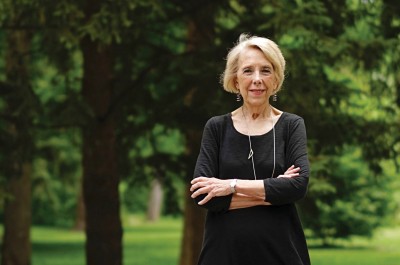Renaissance Woman Prefers the Middle Ages
Sally Livingston | Associate Professor of Comparative Literature
 Before coming to Ohio Wesleyan, Sally Livingston spent a career helping women manage their wealth as the owner of an investment company in Massachusetts. “I really wanted to enable and empower women around money,” she says.
Before coming to Ohio Wesleyan, Sally Livingston spent a career helping women manage their wealth as the owner of an investment company in Massachusetts. “I really wanted to enable and empower women around money,” she says.
After the attacks of Sept. 11, she began to reevaluate, thinking: “Wait a minute, what do I really want to do with my life?”
So she picked up close to where she’d left off in 1972—when she was working on a Ph.D. in Renaissance history at the University of Toronto and was derailed by various life circumstances. She started taking courses as a special student (outside of a degree program) at Harvard University, then was admitted to the Ph.D. program in comparative literature in 2004. She earned her degree four years later, at the age of 61, writing her dissertation on how women over a broad historical time period wrote about their lack of wealth.
“I tell people I had a 22-year sabbatical, because I could learn more languages, I could read whatever I wanted, I could think—all that,” she says.
She came to Ohio Wesleyan in 2011 and is now an associate professor of comparative literature. This year she was granted tenure at the age of 70.
At an age when many are retired, Livingston is still going full speed, despite undergoing treatment for a brain tumor during the past 12 months. She was back in the classroom 11 days after surgery and has kept up a full teaching load, determined not to let her diagnosis define or delay her.
I tell people I had a 22-year sabbatical, because I could learn more languages, I could read whatever I wanted, I could think—all that.
Associate Professor of Comparative Literature
“On my sabbatical next fall, I’m going to learn biblical Hebrew,” she says, as if she’s buying a new pair of shoes. Livingston, the former investment manager, is not just fluent in numbers, but easily slips into foreign languages, too. She is proficient in medieval Latin (“obviously,” she notes, since she considers herself a “basically a medievalist”), along with French (“it’s engrained in me”), Russian (learned in college), and Italian (“the language of my heart”).
Her fluency makes her a natural fit for the Comparative Literature Department, whose professors speak a combined dozen or so languages, and where she melds her love of literature, history, and economics to inform her teaching. Perhaps not surprising for a woman who has had two seemingly disparate careers, Livingston takes a wide view, trying to examine, in her words, “big issues” through the lenses of different cultures’ literature.
“The reason I love literature is you get to understand what makes the world tick. Students can see how it’s different growing up one place or another,” she says.
Her classes are especially popular with OWU’s many international students, who often produce satisfying essays in her Rites of Passage course to the question “What is home?”
The idea intrigues Livingston so much that she’s begun thinking of exploring homesickness and homecoming in the Middle Ages with her third book. Her first, Marriage, Property, and Women’s Narratives (Palgrave Macmillan 2012), was the result of her dissertation and contained chapters on medieval women who rejected marriage, and Virginia Woolf’s women — the latter written at Woolf’s own writing desk, thanks to a friend who owns it.
Livingston spent the past summer at work on her second book exploring frame stories, which can feature stories within a story. The structure somewhat resembles her own career path, separate but similar tales and part of her broad view.
She looked forward to her annual summer trip to work in the library at Harvard and regretted that the conclusion of her treatment prevented her from her other customary summer trip to Italy.
After more than two decades in finance, and years more back in school to complete her Ph.D., Livingston is happy to have finally found her calling, and her home, at OWU. “In many ways, it’s been a dream job, especially at my age,” she says.
Just don’t ask her about retirement. She scoffs. “No, heavens! Why would I do that?”
By Molly Vogel
